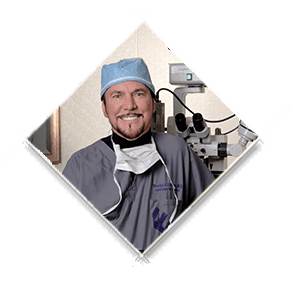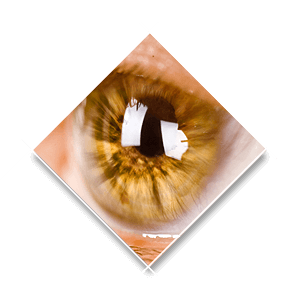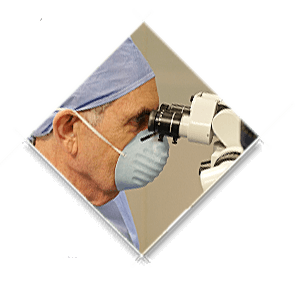Everyone experiences dry eye symptoms at one time or another. Factors like smoky, dusty or windy environments, computers, contact lenses, medicine, eye creams, systemic diseases and surgery can cause your eyes to burn, itch and water. In these cases, over-the-counter eye drops usually provide relief. However, when you have dry eye symptoms all year long – regardless of what you are doing – you may have a medical condition that is causing an imbalance in the amount of tears your eyes are producing or releasing. All of these can be contributors to your dry eye symptoms.
There are different types of dry eye. If you do not know exactly what type of dry eye you have, you will most likely spend money on ineffective treatments. At Vision Quest, we take dry eye evaluation very seriously. We are proud to offer the most comprehensive dry eye testing in Dallas. We use a variety of methods to determine the quality of your tear film and the condition of your cornea.
Dry Eye Tests
We use a diagnostic test to measure the osmolarity (concentration) of tears in your eyes which tells us about dry eye disease. Our TearLab Osmolarity System® is very precise and helps our doctors analyze the health of the surface of your eyes.
If you have increased levels of MMP-9, an inflammatory marker, you may be at a higher risk for developing inflammatory dry eye. Our InflammaDry® test allows our doctors to identify these markers promptly so early treatment can be administered.
The condition of your eyelid glands (the meibomian glands) is essential to detect any type of blockage that may be causing your evaporative dry eye. In addition, your blink pattern and how fully your eyes close with each blink may help determine why your eyes are irritated. Our LipiView® Ocular Surface Interferometer with Dynamic Meibomian Gland Imaging (DMI) allows our doctors to study these aspects of your eye as well as measure the thickness of your lipid layer. If Meibomian Gland Dysfunction (MGD) is discovered, we may recommend the LipiFlow® Thermal Pulsation Treatment.
Types of Dry Eye
The most common type of dry eye, Evaporative Dry Eye, is caused when there is a blockage in your meibomian glands which leads to a shortage of oil on the surface of the tears and quicker-than-normal tear evaporation. If you have Evaporative Dry Eye, no amount of over-the-counter eye drops will help. To get real, lasting relief, you need to treat the root cause of the problem and unblock your eye glands.
Aqueous Deficient Dry Eye occurs when your lacrimal glands do not produce enough tears. This is a common form of dry eye that can be caused by aging or serious health problems such as Hepatitis C, HIV, AIDS, lymphoma, Sjogren’s syndrome and damage or trauma to the eyes. Over the counter and prescription medicines are also high contributors to Aqueous Deficient Dry Eye.
LipiFlow® in Dallas
Vision Quest is proud to be the first practice in Dallas to offer the groundbreaking LipiFlow® Thermal Pulsation Treatment to treat Evaporative Dry Eye. This minimally-invasive procedure involves the application of controlled heat and adaptive pressure to the inner eyelids to unblock the eyelid glands, allowing them to resume production of complex natural oils.
We treat dry eye in Dallas using LipiFlow right in our office; the procedure typically takes less than 15 minutes. Learn more about LipiFlow by watching this short video:
https://www.visionquestdallas.com/dry-eye-dallas/
Is LipiFlow Right for You?
Because there are different types of dry eye, LipiFlow might not be right for your unique situation. Our Dallas dry eye doctors will analyze how your eyes are making tears to determine the best course of treatment. The ultimate goal with treatment is to protect the integrity of the surface of your eyes (the cornea).
You can get a jump start on the process by taking our free Dry Eye Self-Test online right now. https://www.visionquestdallas.com/dry-eye-dallas/
Alternatives to LipiFlow
If the surface of your eyes becomes damaged, Vision Quest offers an amniotic membrane tissue treatment called PROKERA® to naturally heal the damage. Our Dallas dry eye doctors place the thin tissue stretched on a clear ring onto the surface of your eye. The therapeutic insert helps your eyes feel more comfortable and vision is often improved. When healing is complete, the PROKERA insert is removed.
When your dry eye is caused by Aqueous Deficient Dry Eye, tears are escaping your eyes too quickly so our doctors may recommend punctal plugs. These very small plugs can be placed into your tear drainage area to close your tear ducts so your eyes retain an adequate amount of lubrication from your tears. They can be dissolvable or semi-permanent.
Inflammation of the eyes due to dry eye is not only uncomfortable – it can also be damaging to your cornea. Using intense pulsed light (IPL) technology (Lumenis® M22 IPL) our doctors can effectively reduce inflammation to relieve and also improve the health of your ocular surface. You may have heard of IPL technology being used for laser skin rejuvenation; this is the same technology for a different purpose. If your cheeks or areas around your nostrils have little blood vessels showing with age, this might be a great choice for you, adding a secondary benefit to patients with Rosacea.
Treating dry eye symptoms yourself may not be effective or cost-efficient. If you have constantly watering, itchy, red eyes or fluctuating vision contact the Dallas dry eye specialists at Vision Quest today to schedule an eye exam and get the right treatment for relief.












